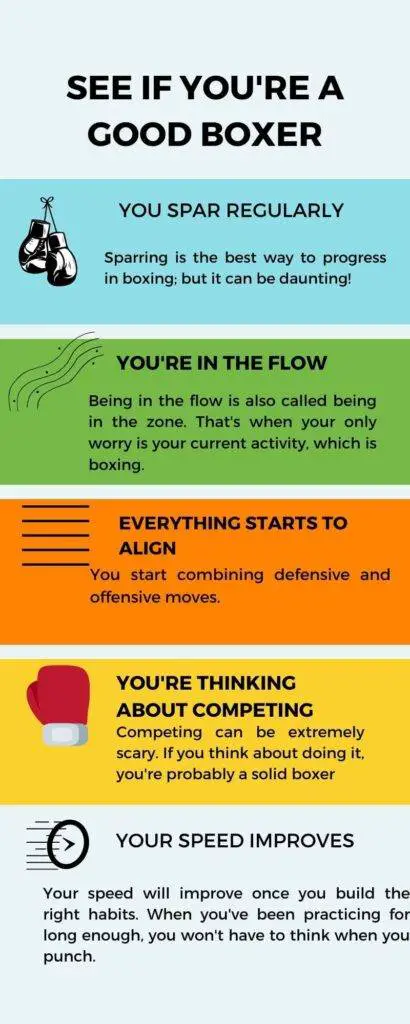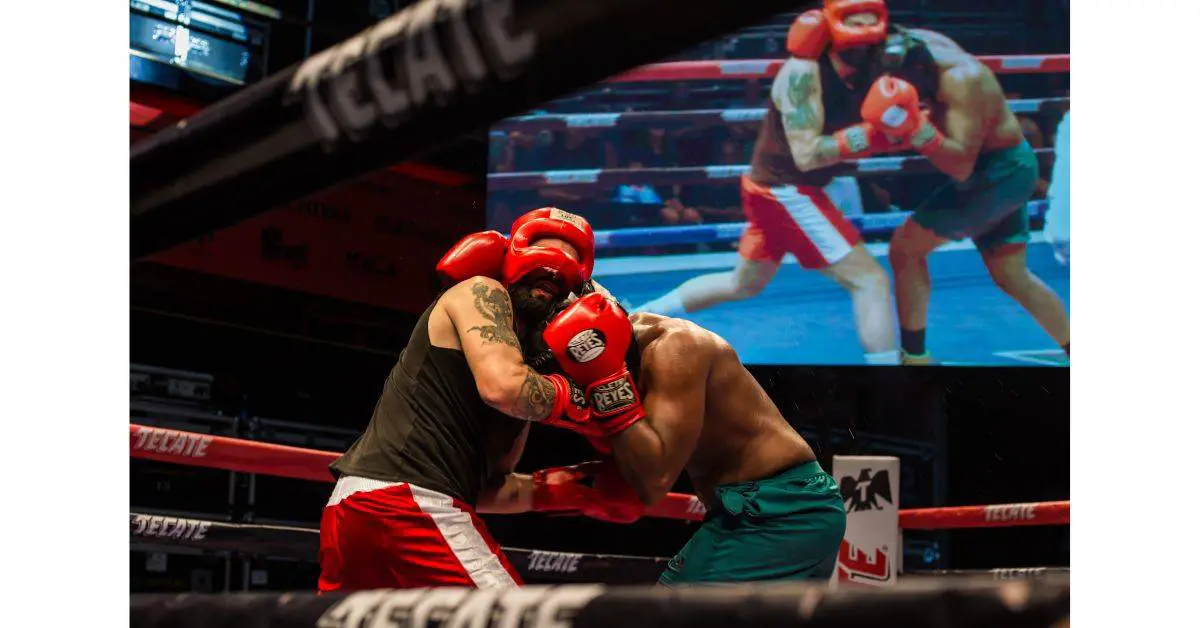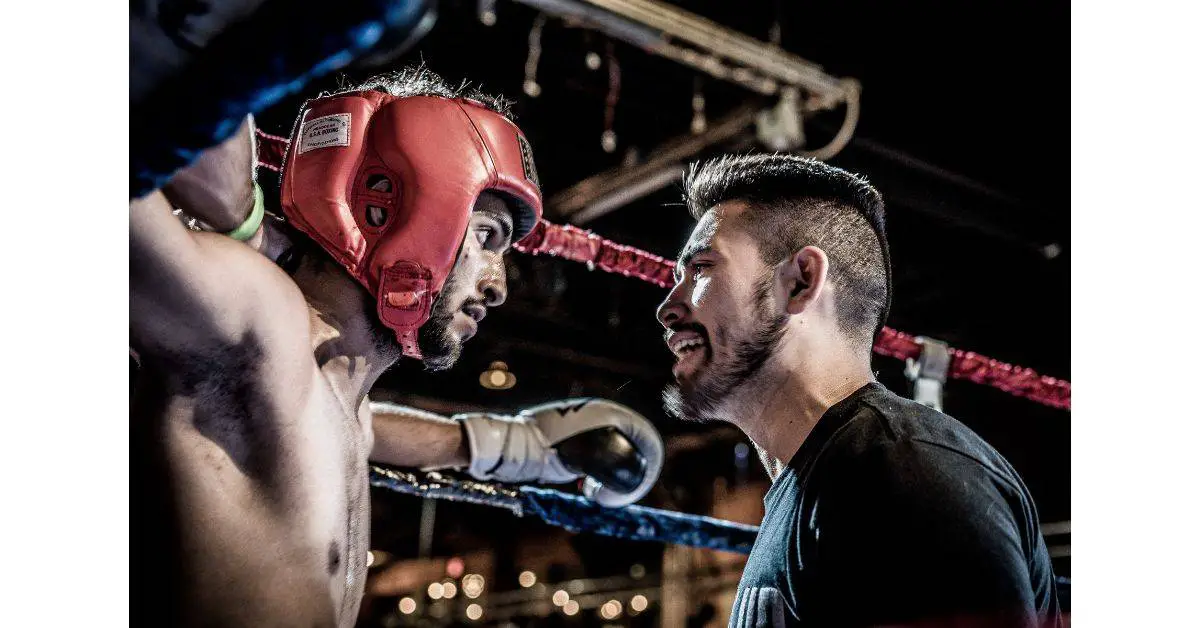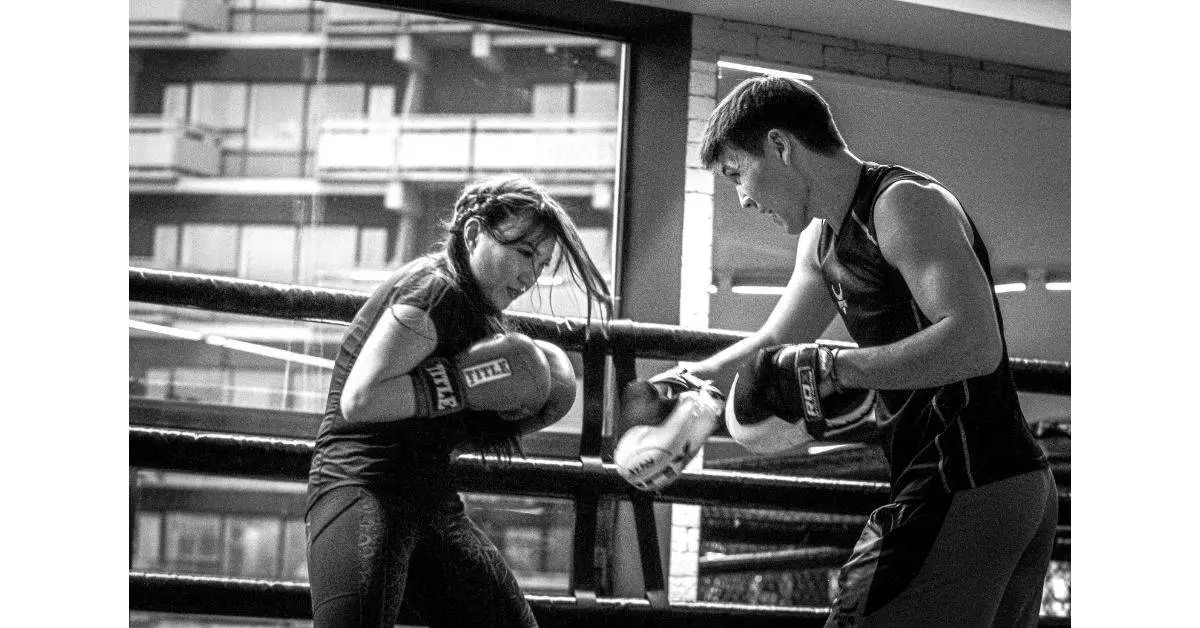Knowing you’re improving in boxing—can be detrimental to your progress. If you want to fill yourself with new motivation and be more prone to stay consistent with your training, you must stop after a while to examine the progress you’ve made. However, it can be difficult for some people.
This article will examine seven ways you can examine in your training to see whether you’re improving. All of them assume you’re only a few months into training. Nevertheless, they still apply for the boxers who have been consistent with training for a few years.
Here are the ways:
- You spar regularly
- When you hit a punching bag, there’s a loud noise
- You’re in the flow when punching
- Your speed greatly improves
- You’re thinking about going amateur (competing)
- You’ve been training for numerous months
- Everything starts to align (offensive and defensive techniques)
If you examine all of them one by one, you’ll be able to really examine your progression rate. Nonetheless, you might only notice a few or even a single one in your training. That’s completely fine and a solid place to start from.
You can, however, continuously examine them along the way. I am sure you’ll be able to slowly see them all line up.
Before we dive in, I want to emphasize that it doesn’t matter if you’re yet to see these ways in your personal training. They will come with time and practice, so don’t bother examining them too often.
Rather, come back to this article to examine your progression once in a while. I encourage you to bookmark or save this article, so you’ll return to it every few weeks.
How to know if you’re good at boxing
Knowing you’re a good boxer—is the first step to filling your motivation tank. It will become tougher and tougher to remain consistent and dedicated to your boxing training if you don’t stop to examine how much you have actually progressed.
Most boxers who end up quitting won’t bother to take a look at their progress. They might view it as a useless activity. And yet, it might save your journey from totally collapsing.
If you’re missing motivation or dedication to this martial art, this article is for you. Likewise, if you don’t see yourself as a good boxer and want to boost your progression rate, this article is also for you.

I encourage you to save this image and this article. Later, you’ll be able to return to them and see if you’ve improved.
Before we dive deeply into the ways, if you want to know how long it’ll take until you see results in boxing, follow the link to an article of mine that answers this question.
#1 – You spar regularly
The first way to really see if you’re good at boxing is whether you spar regularly.
I am aware that some boxers might find it more difficult to start fighting against other boxers. However, sparring can be the best way to see yourself in real action.
Moving the fear factor aside, if you spar regularly, you more than likely are a skilled boxer. Even if you only do so infrequently, you still are likely not an inexperienced boxer.

From my perspective, sparring is the best way you can improve your progression rate. It will give you a reality check whether all the training you did taught you a thing or two.
If you feel as if you’re in the same stage, you should likely change your training routine. That is especially true if you’re training alone or at your home.
Nevertheless, the moral of the story is that if you spar regularly, you more than likely are an experienced boxer who isn’t afraid to put his skills out in the world. It’s also the best way to progress faster in your boxing career.
#2 – When you hit a punching bag, there’s a loud noise
This way can sound quite odd to some people. However, I’m sure you’ll find it interesting once you read it. It can be a solid metric for the amount of force you’re actually putting out with your strikes.
We all know about the 4 primary types of punches:
- Jab
- Cross
- Hook
- Uppercut
And, we also know that when you have punching bag drills, you might lean toward using the same combinations, which isn’t bad practice. Instead, it builds strong habits that you can later use without thinking about—particularly when sparring or competing.
Now, you’ll know when an experienced boxer has a punching bag session only by hearing the loud bangs his punches create in the boxing gym.
All inexperienced boxers will not be able to create nearly as much noise as the more experienced, skilled ones, since they either shouldn’t go full force or they simply can’t create as much force.
When you improve, you’ll notice you start to become this skilled boxer who everyone in the boxing gym knows he’s doing a punching bag drills.
Start listening to the sound different boxers create when they have a punching bag session.
#3 – You’re in the flow when punching
This way is one of the best ways to really know whether you’re improving or not. Let’s first understand what is flow and why it’s important to us.
In positive psychology, a flow state, also known colloquially as being in the zone, is the mental state in which a person performing some activity is fully immersed in a feeling of energized focus, full involvement, and enjoyment in the process of the activity.
SOURCE
Reaching the flow state (being in the zone) will require you to have habits ingrained in your mind. I previously mentioned these, but let’s take a deeper look.
You build habits by constantly practicing the same combinations or techniques. Slowly, your mind will execute these techniques or combinations automatically. Yes, you won’t have to think when you do them.
That’s why experienced boxers are always throwing powerful punches; they essentially can’t throw weak punches, as they’ve practiced the same technique for years, or sometimes decades.
So, how does that relate to being in the zone?
I’m glad you asked. Being in the zone will require you to have some habits ingrained in your brain. When that happens, you won’t have to think about anything or anyone. Rather, you’ll have your utter focus and concentration on one activity. In our case, throwing powerful punches.
#4 – Your speed greatly improves
In your next boxing session, I want you to pay close attention to your speed. This way closely relates to building habits, which we previously mentioned. Let’s see how it relates to speed.
Once you build powerful habits that your brain can use when you do a particular technique, you also won’t even need to think about it.
And, as a result, you’ll perform it in much greater speed. For instance, if I need to think about turning my hip when throwing a cross, I’ll perform the actual cross more slowly.
However, if my mind knows everything about how to throw the actual cross, then I’ll also perform it much faster.
Likewise, your footwork will speed up when you’re an experienced boxer. That will be especially true if you spar regularly. Your mind will start to react automatically when you notice your opponent throwing a certain punch.
Because you’ll react much faster and automatically, your speed will greatly improve. For instance, when you notice your opponent throws a left hook, you might dodge or block it faster, and thus create an advantage.
If you want to learn about the best footwork drills that’ll increase your power and speed, follow the link to see which are the best ones you can start doing right now.
#5 – You’re thinking about going amateur (competing)
Thinking about competing—can be a solid sign for you wanting to improve more. Can you imagine someone just starting out, really wanting to compete? While it might be one of his goals, he’s not as likely to actually do that right now.
But, if you’re thinking about it and really wanting to go amateur right now, you probably think of yourself as a boxer who can do that. We all come back to self-belief when we examine the next part of this article, which will discuss tips to progress faster in your boxing journey.

If you think you can go amateur, you more than likely are ready to take this step. While you don’t have to compete and can stick with sparring and typical boxing training, it’s a solid sign that you have improved.
So, ask yourself: “Do I think I’m ready to compete?” If the answer is yes, you have improved.
If you want to learn how you can become an amateur boxer, follow the link.
#6 – You’ve been training for numerous months
The next way isn’t really in your control, but it’s one of the best ways to check if you have improved as a boxer.
If you’ve only been training for a month, for example, you might start grasping the basic concepts of boxing. So, you have improved but, chances are that you’re still inexperienced.
However, if you’ve already been training for a few months, you likely are an experienced boxer that’s ready to start competing, even if you don’t think of yourself that way.
Start believing that you’re a solid boxer, and you’ll get there faster. That’s how you adopt a growth mindset, which we’ll discuss in part II of this article.
Concluding, the time you’ve been training correlate directly to your skill level. While different boxers have different progression rates, the concept stays the same.
#7 – Everything starts to align (offensive & defense)
This last way is what I believe to be the most enjoyable feeling as a boxer. That is, when everything starts to line up, and you spot yourself using everything you have learned to your advantage.
When you execute a particular defensive move followed by a fierce punch, you’re more likely to hit it. That’s the basic concept of a counterpunch. That will only occur, however, when you’re skilled enough to think outside the box and combine the two techniques.
I highly encourage you to watch the following video to understand what I mean when I refer to a fierce counter punch.
These moments occur when everything begins to align, especially defensive and offensive moves. When you see that happening, not only will you feel much more content, as it can be highly satisfying to land one of these, you’ll also know you have greatly improved as a boxer.
Now, let’s dive into the second part of this article: tips that’ll help you improve faster in your boxing journey.
By combining the two parts of this article, hence progressing faster while examining your improvement, you’ll be able to stay consistent effortlessly while learning the art faster!
So, let’s dive in.
Tips to progress faster in boxing
This is the second part of this article. Thus far, we’ve discussed the different ways you can examine in your own boxing journey to see whether you’re improving.
Now, however, let’s see how you can improve the speed in which you move forward and learn more about the martial art of punching.
#1 – Find your purpose
The first tip I can give you will be to find your utmost purpose. That not only applies to boxing, but to everything in life. If you want to always be consistent and motivated to work more and keep up with training effortlessly, you must have a reason.
I’d like to take Apple (the company) as an example. They have their purpose, to change the status quo in the tech world. That’s why their product lines are so consistent.
The same has to apply to you as a boxer. If you have a purpose, such as wanting to learn self-defense, so you can protect the people close to you, you’ll be more prone to show up to training, as you’ll have a reason.
Here are some purposes you can implement in your boxing training: (You can choose a few if you’d like!)
- Losing body fat
- Gaining muscle
- Learning to fight
- Building your character
- Starting to love yourself
- Building confidence
- Improving mental health
- Investing time in yourself
- Punching hard
- Learning how to use self-defense
#2 – Follow a boxing YouTube channel
You don’t have to learn only from your coach. Rather, you can do your homework to ensure you progress and learn much more quickly.
That’s why I encourage you to examine some YouTube channels until you find one that’s suitable to your desires and needs.
For example, you may want to hone your punching technique. In that case, you can watch a video about little tricks to help you generate more force with your hits. Then, you apply each one after the other. Eventually, your power will increase, with enough practice, of course.
#3 – Have a growth mindset
Somewhere in part I of this article, I mentioned the term “growth mindset“. You might have been confused over this term. So, let’s explain how it can benefit you.
A growth mindset means that you thrive on challenge, and don’t see failure as a way to describe yourself but as a springboard for growth and developing your abilities. Your intelligence and talents are all susceptible to growth
SOURCE
If you adopt this mindset of always seeking out challenge and failure, you’ll also progress much faster. Let’s examine the cases of two different boxers:
The first boxer doesn’t take any steps out of his comfort zone. He’s always doing the same training, meaning that he progresses only in particular areas.
The second boxer always seeks challenge. He spars, competes, and tries different exercises that he saw someone else doing. As a result, he’s failing often, but doesn’t define himself from his failures.
Who do you think will progress faster?
#4 – Get obsessive over boxing
This tip will require you to take a step forward. If you want to really amp up your boxing game a notch, you must get obsessive over it.
For instance, I’m currently obsessive over lifting weights. Therefore, I’ll be more prone to going to the gym and lifting weights. Of course, it’s all relative; but because I’m obsessive over it, I’m also much more likely to do it.
Likewise, you’ll be more eager to learn more about boxing if you’re obsessive over it. So, how do you obsess over it? You begin by finding your purpose and let things naturally take you to it.
Trust me, you will complete your purpose if you believe in it.
#5 – Stay consistent with training, especially when you don’t feel like it
This last tip is about dedication and consistency. Today, people are listening too often to their minds. They don’t let themselves progress too far, as they’re afraid of success.
As a result, whenever they don’t feel like training, they’ll skip the next session. Another example for this is whenever they want to check their social media, they simply do it, regardless of the current activity they indulge in.
You must stay consistent with your boxing training, especially in the moments when your mind begins to tell you to skip this session. You’ll start making excuses. But, if you ignore them, you’ll level up your dedication in the long-term, a highly helpful trait amongst successful people.
What makes you a good boxer?
Being a good boxer isn’t only about how long you have been boxing for. Instead, it’s about how dedicated you are to the craft. Likewise, if you don’t have proper, well-defined goals, you’ll also progress much slowly.
A good boxer has a mix of various traits and strengths, including physical strength, endurance, a solid aerobic shape, knowing how to punch, and being able to combine defensive and offensive moves. Working on multiple of these traits at once—will be better, since it’ll help you progress faster.
Being a boxer is more than simply punching hard. It’s a test of your character. Being a skilled boxer is about how hard you push your physical and mental boundaries in training, and how inclined you are to work harder than all your competition.
If you want to learn about the training routine of professional boxers, so you can build a similar one for yourself, follow the link to an article of mine on the topic.
Final words
There isn’t a better feeling than seeing your progression concretely. It’s common sense to know you have progressed after every boxing session. The real beauty comes when you see it take form.
As such, testing yourself once in a while—is critical to fill yourself up with motivation and eagerness to learn in both the short and long-term. As a result, I highly recommend saving this article and coming back to it once in a while.
If you enjoyed reading this article, you’ll also enjoy reading about whether boxing is bad for your brain.

